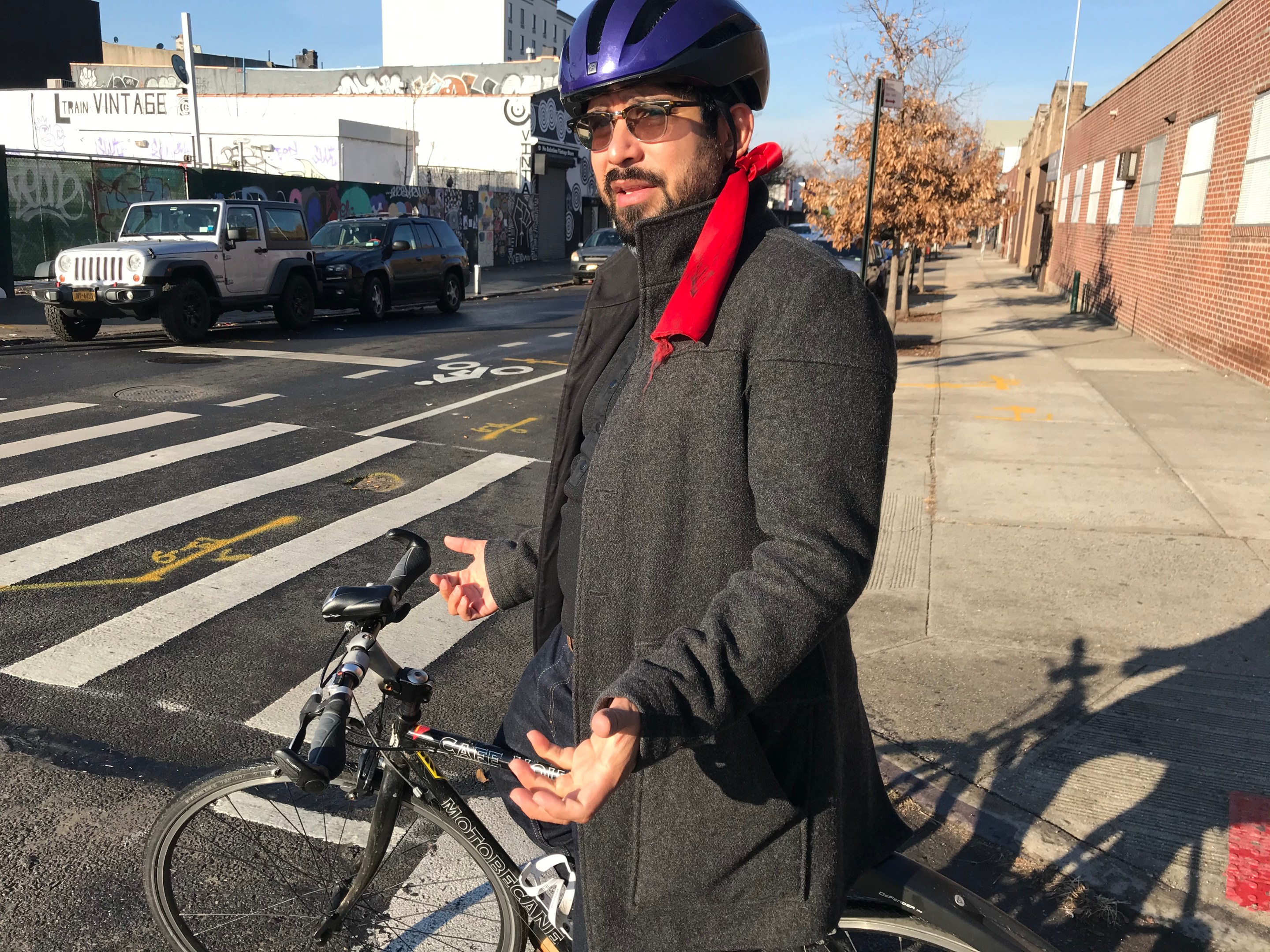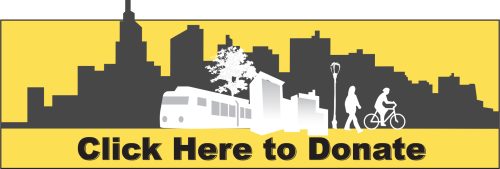
This is the first in a series of bike rides with mayoral candidates orchestrated by reporter Dave Colon. Mayoral candidates interested in taking the "Dave Colon Open Challenge" should email dcolon@streetsblog.org.
Carlos Menchaca, one of the many people running for mayor in 2021, used to ride his bike on Fourth Avenue when it was one of the deadliest roads in Brooklyn. Having shepherded a transformation of the street into a place where families and children can ride comfortably, he sees the win as proof that a big dream can become real policy.
"This was a dream and now it’s real," said Menchaca, who joined Streetsblog for a ride down Fourth Avenue, as a mother and daughter rode north on the protected bike lane. "I fucking love that, I love that. It just wouldn’t have been possible. So car-less boroughs? Let it be a dream for us and we can get there."
How we get "there," whether it's car-free neighborhoods, a truly connected bike network or a city with half as many on-street parking spaces as it has now is where the bike rubber meets the green paint. Menchaca's vision for that transformation depends on a lot of conversation among neighbors, so hopefully you like community board meetings.
Here's what we learned on our ride with Menchaca, the first of the mayoral candidates to accept the annual "Dave Colon Open Challenge":
Power to the people
Menchaca, a term-limited Council member who represents Sunset Park and Red Hook, expresses an earnest enthusiasm for what he called "people power" and for creating a government where direct democracy is the habit of the land.
Agencies, Menchaca said, should be designed for fast community response when a resident has a problem or a suggestion, an idea he was able to expound on at the very start of the ride: Upon encountering a construction site at Warren Street that spilled into the bike lane and did not provide a safe route for cyclists despite city law, Menchaca explained his ideal solution (beyond the contractor just following the law):
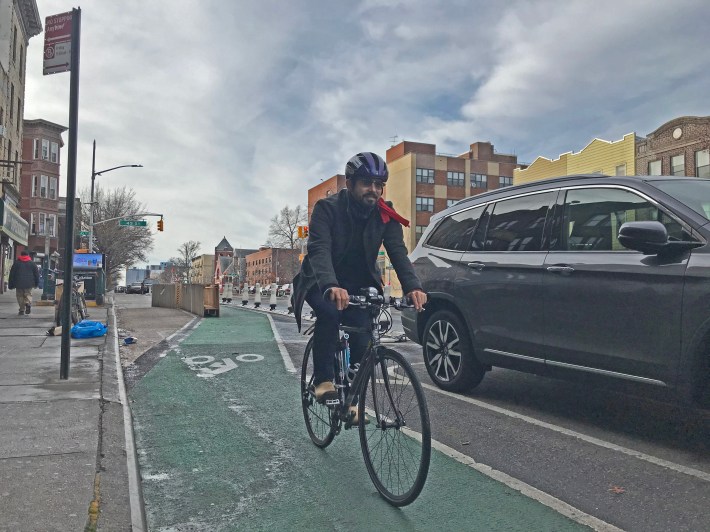
"If someone wants to take care of that, they should be able to have a very short series of steps to make that happen. That means someone should be able to call a local office and get someone on it and be responsive. There needs to be an expectation that a community member can understand the law and confront agencies to make it happen," said Menchaca.
Throughout the eight-mile ride, Menchaca continuously came back to his view that the next mayor shouldn't be someone who managed and delegated, but someone who builds collective power.
"The city’s work, the government’s work, is that of an organizer," he said. "How do you build constituency for an issue that becomes prioritized and government needs to fix? It’s not for me to manage, for me to singly come in and save the day; it’s about me building a sense of connection, engagement, on all these issues."
But the next mayor will have a lot on his or her plate when it comes to livable streets. The Streets Master Plan tasks Mayor de Blasio's successor with installing 50 miles of protected bike lanes and 30 miles of bus lanes every year. Garbage piles line sidewalks, cutting down on pedestrian space, and the city is only looking at a pilot to deal with the problem in 2021. Vision Zero is nowhere close to delivering on de Blasio's promise of zero traffic deaths by 2024. And the next mayor will also need to continue the revolution on curbside spaces — the city has about three million spots for on-street car storage, but the outdoor restaurant initiative shows the many better public uses for all that public space.
I asked Menchaca how many of those spaces would be left after his first term: "I would aim for half," he said.
"That’s my heart, that’s what I would say. I think that we should bring that challenge in every neighborhood: How can we look at reducing on-street parking and develop a series of other goals a like bike network, and then we can get to that by cutting it up into smaller pieces. That’s setting a vision, and then asking communities how would we do that? You should be a part of that conversation. I don’t want to tell you how to do that, we should do it together."
Stop, collaborate and listen
The better outcome for street safety and transit projects starts with a better question, according to the candidate.
"The question, 'Do we want a bike lane, yes or no?' is divisive. But the question, 'We’re going to build a bike network, so where?' changes it," Menchaca said. "We don’t need management, we need leadership."
With that question as a guide, Menchaca said unequivocally that his administration could install the bus and bike lane mileage required under city law. He floated a more harmonious process, where DOT planners do their work separate from political controversy, and leave room for neighborhood residents to give input that makes them feel invited into the process.
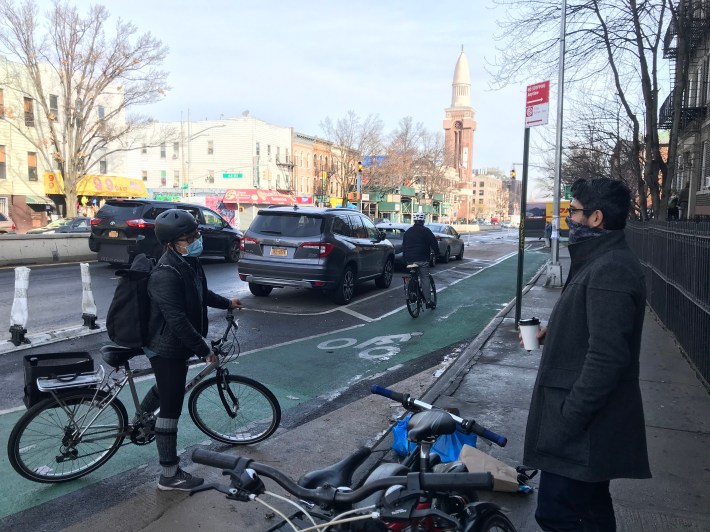
"The DOT could bring three, four, five scenarios for a street design, let’s look at all of them. Does the Transportation Committee [of the community board] want to build a different example? Let’s all look at the data together, let’s learn, let’s talk about what other communities have done that we haven’t yet. Now we’re talking. And that’s a better community board meeting than 'for' or 'against,'" Menchaca said. "We have to be honest with our neighbors. That’s what I learned [from the Fourth Avenue bike lane experience]. And part of that honesty is saying, 'I want a bike lane. I think we can get there.' When you have those conversations, it changes the way people engage and it brings people in, pulls people in."
A cynic, or a local reporter (what's the difference really?), could question the wisdom of placing the fate of an interconnected citywide bike network into the grinder that is the community board process. Menchaca isn't the first person to suggest that there's a role in shaping bike lane plans for the community boards, where, alas "I'm not opposed to bike lanes or bus lanes, but I am opposed to this one" is an all-too-familiar refrain. That same, "Bike lanes have a place, but not this one," argument set back the simple act of painting lines on the ground in Bay Ridge for 10 years.
Other people might ask what we're electing someone for, if everything has to start at the ground level, taken care of at the tail end of a three-hour meeting after a series of liquor license votes that the State Liquor Authority ignores. Menchaca though, counters that while New Yorkers may think they're too busy to plan a bike network or determine how to halve the neighborhood's parking space, they never seem too busy to oppose plans that they feel are dropped in their lap.
"That might be a sentiment for New Yorkers: 'I’m too busy, I’m running my own life, I don’t have to worry about where the bike lane goes, don’t bring me into this.' And then, you make a decision and there’s a massive protest. I refuse to believe anyone who says New Yorkers are too busy because we’ll organize to fight something. People are engaged, they want to be engaged, and I think it changes if you have a government that’s respectful. People will engage in the process if they know that their voices are going to be heard and have an impact, they will feel valued," Menchaca said.
There's also a more positive element to community consultation. Menchaca also said that the participatory budgeting taught him that his constituents were actively interested in being part of the city planning process, and that learning from the experience
"People know now what is costs to put stuff down," he said. "And they have the phone numbers of people at the School Construction Authority or Department of Transportation or Parks Department and they’re taking care of stuff and they’re building things out. And they bring it to me and say, 'We’ve done the legwork, go make it happen.' That’s partnership. People want to be positive forces, and if we can give them that tool, it grows exponentially, people get pulled in and that’s all positive and beautiful."
You can fight City Hall
So what separates Menchaca from Domenic Recchia or Chaim Deutsch, Arthur Schwartz or Denise Keehan-Smith — names from the past and present who claimed they were standing up for the community, but really just finding ways to oppose street safety projects?
Beyond his heartfelt belief in grassroots power and his enthusiasm for every family he saw riding on Fourth Avenue, the candidate's belief that good outcomes can come from the ground up is informed by his experience on his two most well-known transportation initiatives. Menchaca credited activist Doug Gordon for suggesting the bill that allowed cyclists to take advantage of leading pedestrian intervals. And getting the protected bike lane on Fourth Avenue was an instance where Menchaca fought (or at least pushed) City Hall and won.
Early plans to redesign Fourth Avenue didn't include a bike lane, and getting the DOT to accept the idea included a staffer from Menchaca's office going out to literally measure the street width in an attempt to prove there would be room for the bike lane. Menchaca said that because the conversation around Fourth Avenue started from a place of, "Should there be a bike lane?" he had to fight a two-front war against community organizations who suggested it would cause gentrification and against the DOT, which initially did not want to install the lane there. Menchaca was familiar with the way he had to play the game, but sounded unenthusiastic about it.
"I started to immediately pay attention to CB7 and brought in more of a voice from pro-bike and transportation alternative voices to the community board, because I had some power in appointing folks. We could do it that way. We could play a politics game where I have to stuff a community board with people who will think a certain way. Or we could give it to the whole community and build out community engagement processes for bike lanes, for other amenities that we need, for car share programs or Citi Bike," he said.
Talk, talk, talk
Menchaca would enter office with a set of philosophies, but his guiding principle seemed to be being able to talk things to a satisfactory conclusion.
How did he convince police officers to stop parking in Fourth Avenue bike lane? "I held so many conversations and meetings [with the precinct about it]."
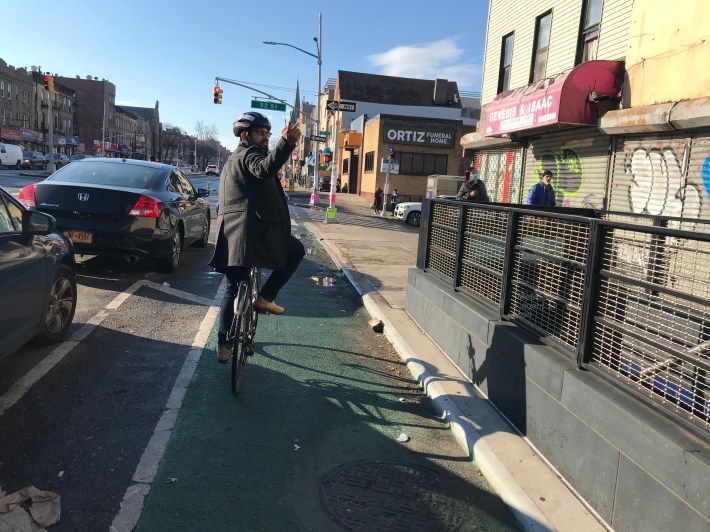
What do those 1.5 million repurposed parking spots become? He'd like public seating and spaces for art incubators, but he wants to talk about it with the community. Conversations are happening with City Council candidates on how they'd like to see a bike network take shape in their district, how they can make a joint platform under a municipal Green New Deal banner. How does New York City escape its designation as Trash City? Take a guess.
"There’s a sentiment that it’s barbaric to put bags of trash on the sidewalk. You go anywhere else in the world and there’s a whole other way. Then you start looking into it and it’s because the unions say they want a person picking up the trash for this job. So, let’s talk about that. Is it about a job? About something else? I want to utilize this campaign to have those conversations and have the mayoral candidates, all 700 of us, respond."
A mayor on two wheels
Cyclists can at least rest assured that more meetings or longer meetings are not an intentional chokepoint Menchaca is constructing to later shrug his shoulders at if nothing happens, because he is one of them. He's been ticketed for running a red light (turning right on a red near City Hall), he's been clipped by a 16-wheeler, he's had two bikes stolen from him. Menchaca knows the condition of the city streets like any bike commuter does, and credits it for his commitment to fixing the situation.
"If you’re on a bike on New York City, you have a count of the times where you almost had a hit, if not an actual hit. That’s just the reality and that’s terrible. But this is our life as cyclists. We take these risks, because we have to get to work, we have to get to where we want to get to, and this is our mode and we love it and the city should provide us a network to get to a place safely. End of story."
But he also cherishes the way a bike gives him total sensory immersion into the city.
"If we were in a car we would not be able to smell that," he said as he passed a Christmas tree display near the Gowanus Expressway. "It’s my favorite thing about riding a bike. Just this morning on the way to you, I smelled ramen, like the kind you get in a pack that you eat in college and it takes you back. I smelled some marijuana, someone doing some wake-and-bake. Good for them."
And the other great thing about a mayor on a bike? During our ride, Menchcaca stopped to talk and catch up with multiple people on Fourth Avenue. Being on a bike is different from being in the mayor's massive SUV: you're not shielded from the public, angry or otherwise.
"What’s the best way to stay accountable? Be on a bike," he said. "There’s no two-ton steel vehicle that will protect me from the constituents. Hit me, I’m here. What needs to happen? We went from a helicopter mayor to an SUV mayor, so it’s time for a bike mayor."
The mayoral candidate also seems more willing to see mass car ownership as a problem, a symptom of poor planning, than the current mayor does.
"The private car has somehow taken an unfortunate space in our psyche," Menchaca said. "You either want to deal with the symptom or deal with the cause. This is an organizer’s dilemma. Convene and come up with solutions to the problems people actually have that they’re trying to solve with a car," Menchaca said, listing shopping, getting out of the city and bringing kids to school as problems to solve without a car.
But solving that problem isn't going to come from CEO Carlos Menchaca, it's going to have to come from you.
"People want to be the change," he said. "Then they go through a process that shuts them down immediately and disempowers them and they shut off and get pissed off and blame everything and everyone and become disgruntled. We have to change that, and allow for everyday New Yorkers who want what’s best for their neighborhood and city to be part of government, and build a relationship where a request can be honored."
